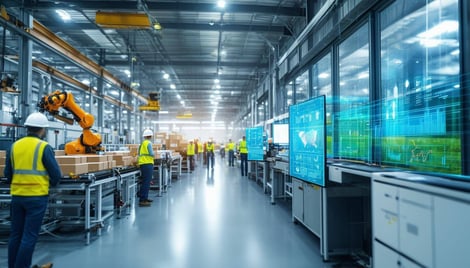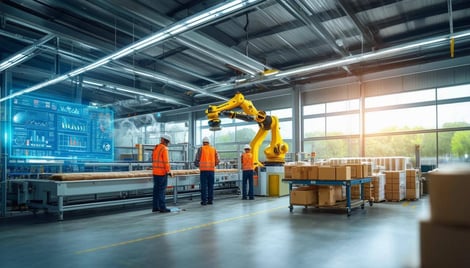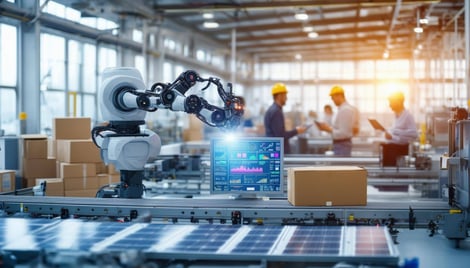Industrializing Machine Learning in Packaging Manufacturing
Machine learning (ML) is no longer a futuristic technology relegated to tech startups or research labs. In the packaging manufacturing industry, ML has emerged as a transformative force, driving efficiency, reducing waste, and optimizing operations. As a Plant Manager, understanding how to industrialize ML within your facility can position your operations for sustained success.
By integrating solutions like PlanetTogether with enterprise systems such as SAP, Oracle, Microsoft, Kinaxis, or Aveva, the journey becomes both scalable and impactful.

The Case for Machine Learning in Packaging Manufacturing
In today’s competitive landscape, the packaging industry faces multiple challenges—shorter production cycles, demand volatility, stringent sustainability goals, and pressure to optimize costs. Machine learning offers solutions to these challenges by enabling:
Predictive Maintenance: Identifying machine wear-and-tear patterns to minimize downtime.
Demand Forecasting: Analyzing historical and real-time data to predict production requirements.
Quality Control: Using computer vision and anomaly detection algorithms to reduce defects.
Energy Optimization: Reducing energy consumption through smart scheduling and machine utilization.
Yet, the true potential of ML is unlocked when it’s not implemented as an isolated initiative but industrialized across processes and systems.

Industrializing ML: What Does It Mean?
Industrializing ML refers to embedding machine learning capabilities seamlessly into the core of manufacturing operations. It ensures that ML models move beyond prototypes into fully operational systems that continuously deliver value. For a packaging manufacturing facility, this involves:
Data Integration: Consolidating data from diverse sources such as sensors, ERP systems, and production schedules.
Automation: Embedding ML models into automated workflows.
Scalability: Ensuring models can handle growing data volumes and new use cases.
Governance: Establishing frameworks for monitoring, updating, and validating models.

Role of Integration: PlanetTogether and Enterprise Systems
A significant enabler of industrializing ML in packaging manufacturing is integrating advanced planning and scheduling tools like PlanetTogether with enterprise systems such as SAP, Oracle, Microsoft, Kinaxis, or Aveva. Here’s how these integrations amplify the impact of ML:
Data Consolidation and Accessibility
Integration ensures that PlanetTogether’s scheduling algorithms can access and analyze data from ERP systems like SAP or Oracle in real-time. This consolidated data enables more accurate ML predictions for production planning, machine utilization, and labor scheduling.
Example: ML models use SAP’s sales forecasts and historical production data to optimize schedules in PlanetTogether, reducing idle machine time and boosting throughput.
Enhanced Predictive Maintenance
By connecting IoT data from Aveva with PlanetTogether, ML models can predict machine failures and trigger maintenance schedules without disrupting production timelines.
Example: Sensors detect abnormal vibrations in a key production machine. The integrated system schedules preventive maintenance during a low-demand period, minimizing disruptions.
Real-Time Decision Support
Kinaxis’ demand planning capabilities, when integrated with PlanetTogether, enable ML models to adjust production schedules dynamically based on changing market conditions or supply chain disruptions.
Example: An unexpected surge in demand for a packaging product prompts the system to reallocate resources and prioritize production, ensuring on-time delivery.
Sustainability Tracking and Optimization
Microsoft’s Power BI and Azure AI tools, when integrated with PlanetTogether, can leverage ML to monitor energy consumption and optimize resource usage.
Example: ML algorithms analyze data from production processes to identify energy-intensive steps, enabling Plant Managers to make adjustments that align with sustainability goals.
Steps to Industrialize ML in Your Facility
Achieving industrialized ML requires strategic planning and phased implementation. Here’s a roadmap to guide you:
Step 1: Define Clear Objectives
Identify the key challenges you aim to address with ML. For packaging manufacturing, these might include reducing defects, optimizing production schedules, or improving energy efficiency.
Step 2: Build a Data Infrastructure
Ensure your facility has the necessary infrastructure to collect, store, and process data. Integration with systems like SAP and PlanetTogether is critical for creating a unified data ecosystem.
Step 3: Develop and Test ML Models
Collaborate with data scientists and technology partners to develop ML models tailored to your needs. Conduct pilot tests to validate the models’ performance and refine them as needed.
Step 4: Integrate ML into Existing Systems
Embed the ML models into tools like PlanetTogether and link them with ERP systems, IoT platforms, and other enterprise applications.
Step 5: Automate and Monitor
Automate workflows using ML predictions and establish monitoring systems to track the models’ accuracy and performance over time.
Step 6: Train Your Team
Provide training to your workforce, ensuring they understand the benefits and operational aspects of ML-driven systems. This fosters adoption and encourages innovation.

Benefits of Industrialized ML for Plant Managers
By industrializing ML, Plant Managers can unlock a host of benefits:
Increased Efficiency: Streamlined production schedules and reduced downtime.
Enhanced Quality: Automated quality checks that reduce defects and waste.
Cost Savings: Optimized resource utilization and energy savings.
Agility: Faster response to market changes and customer demands.
Sustainability: Improved alignment with environmental regulations and corporate sustainability goals.
Challenges and How to Overcome Them
While the benefits are compelling, industrializing ML does come with challenges:
Data Silos: Lack of integration between systems can hinder data access. Overcome this by prioritizing integration projects with platforms like PlanetTogether.
Change Management: Resistance from the workforce can slow adoption. Invest in training and communication to highlight the benefits.
Scalability Issues: Scaling ML solutions across multiple production lines or facilities can be complex. Collaborate with technology partners to ensure scalable architectures.
Industrializing machine learning is not just a technological upgrade; it’s a strategic imperative for packaging manufacturers. By integrating ML capabilities into everyday operations through platforms like PlanetTogether and leading enterprise systems, Plant Managers can achieve unprecedented levels of efficiency, quality, and sustainability.
The time to act is now. Are you ready to take your manufacturing operations to the next level? Contact us today to learn more about how PlanetTogether can help you achieve your goals and drive success in your industry.
Topics: PlanetTogether Software, Integrating PlanetTogether, Real-time Decision Support, Enhanced Predictive Maintenance, Packaging Manufacturing, Data Consolidation and Accessibility, Sustainability Tracking and Optimization





















LEAVE A COMMENT